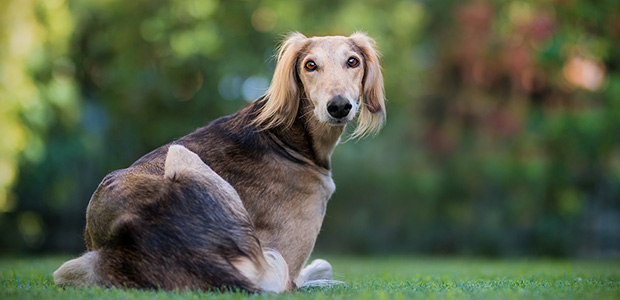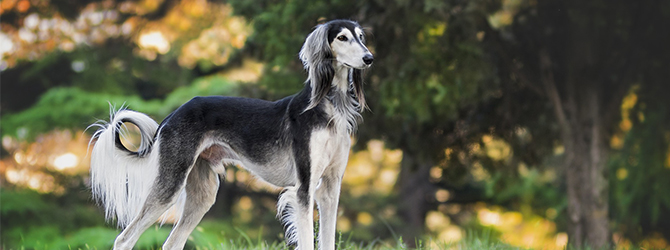The Saluki: thinking of getting a Saluki?
First Published: 28/10/2019
Last Updated: 17/10/2023
Salukis are sweet natured, sensitive souls who know their own minds. They’re very low maintenance too – so long as they get their exercise.
Let’s take a closer look at the Saluki.
Place of origin: The Fertile Crescent (Middle East)
How big do Salukis get? 58 – 71cm
How heavy are Salukis? 18 – 27kg
Saluki Life Expectancy: 12 – 14 years
Types of Saluki: Smooth, Feathered
Colour: White, Fawn, Cream, Tan, Gold, Red
Please note: A dog’s exercise, training/stimulation and grooming requirements can depend on several factors such as age and health. The same goes for ongoing costs of ownership. For advice on one specific dog, we always advise chatting with a vet.
How much exercise does a Saluki need?
Salukis have a great deal of energy and love to run! Your Saluki will need 2 lengthy walks every day.
Historically, Salukis were bred to chase prey. Although they’re domestic pets today, they still retain their hunter’s instincts and can get distracted by small animals when they’re out walking. When walking your Saluki through a populated area, aim to keep them on the lead until you get to somewhere more remote and secure.
As they’re energetic dogs, it’s useful if you have a large garden for your Saluki to roam about in – just make sure your garden is nice and secure so your Saluki can’t escape if they see something they mistake for prey.
Training: how to train a Saluki
Salukis know their own minds. They’re independent and occasionally stubborn, so not always the easiest breeds to train. They love to chase and retrieve things, and are less interested in obeying commands.
Begin your Saluki’s training when they’re young, or as soon as you bring them home. Use positive reinforcement at all times; Salukis are particularly sensitive breeds so, although you should never raise your voice when training any dog, this is perhaps more important for breeds such as Salukis.
With plenty of patience and positivity, there’s no reason your Saluki won’t become a perfectly trained and sociable addition to the family.

Grooming: do Salukis shed?
When it comes to grooming and coat care, Salukis are a very low maintenance.
They don’t shed very much and tend not to have a strong ‘dog smell’ either. To remove dead fur and keep their coat in tip-top condition, you’ll only need to brush your Saluki on a weekly basis. Salukis only need bathing when they’re dirty (or if they’ve rolled through something smelly!)
Salukis are strong candidates for dental health issues, so be sure to take especially good care of their teeth. Complete their grooming routine with regular tooth brushing, nail clips and ear checks.
Saluki temperament, socialising and ideal home environment
Salukis are generally soft natured and quiet. They aren’t the biggest fans of strangers and other pets, although they do thrive in the company of their owners.
They like their exercise and need plenty of it to stay stimulated, but they’re not so keen on game-playing. Salukis are typically good with children, but if you’re looking for a dog your children can play games with, a Saluki may not be the breed for you.
If you lead a quiet lifestyle and are eager to get out and about more in your spare time, you may have met your perfect match!
Cost of owning a Saluki
When considering the lifetime cost of owning a dog, remember to take into account:
- Breed-specific food
- Veterinary care
- Pet insurance
- Kennels or dog sitters
- Grooming costs
- Toys and equipment
Need more info?
For more info on finding the best dog breed for you and your lifestyle, have a chat with your vet.
Find your nearest vet using our Find a Vet page, or speak to a vet online using Online Vets.
